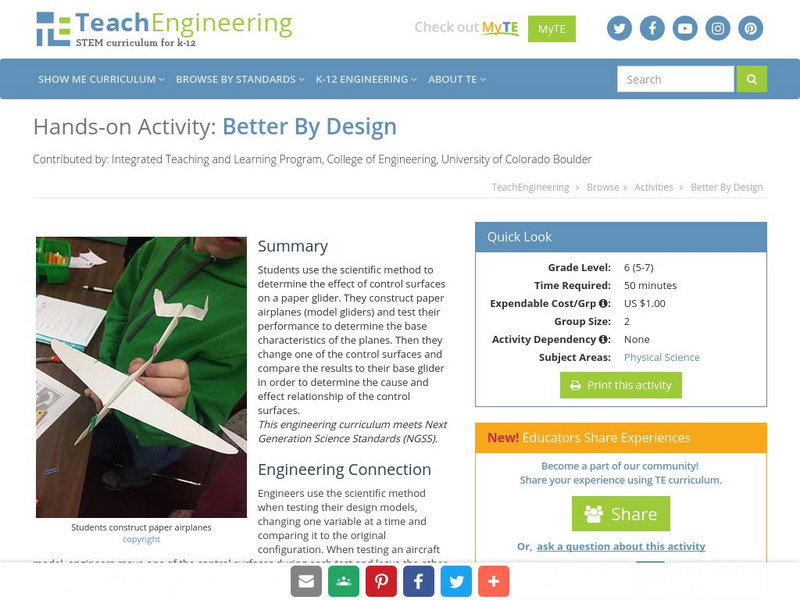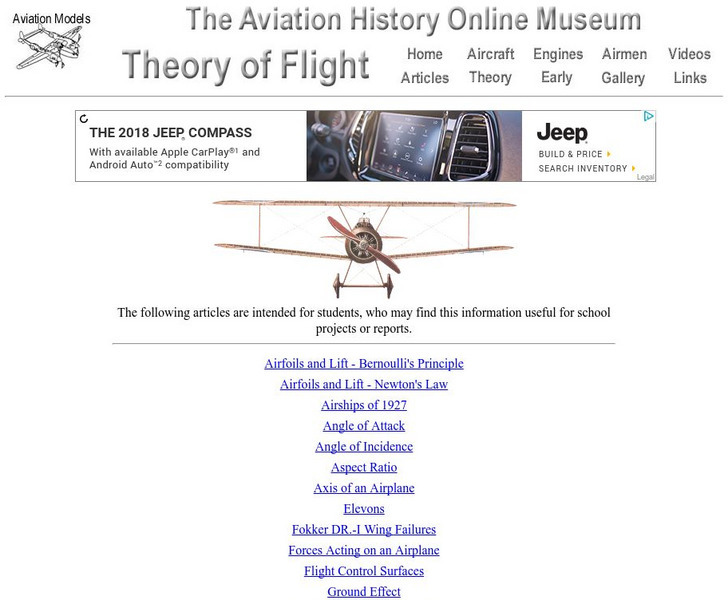Curated OER
PHYSICS OF FLIGHT
Ninth graders study the basic principles of flight, including the Bernoulli Principle and Newton's Laws. They construct and study model aircraft
Curated OER
Aircraft Trajectory Problem Set
Students read text from a NASA Web-based textbook then demonstrate an understanding of the text by using it to complete an activity on aircraft trajectories.
Curated OER
Size Effects Problem Set
Students, after reading the Size Effects page from a NASA Web-based textbook, demonstrate an understanding of Size Effects by answering questions.
Curated OER
The Lift Equation Problem Set
Students, after reading the Lift Equation page from a NASA Web-based textbook, demonstrate an understanding of the lift equation by answering questions.
Curated OER
The Baseball and Air
Students use Curveball to complete the activity to determine how the speed of airstreams changes in relation to changes in the distance of the airstream from the center of the baseball.
Curated OER
Did You Catch My Drift?
Pupils, through the use of the Curveball interactive software package, become familiar with the way in which the flow of air across or around an object affects its ability to lift, spin, and curve. After reading the explanation given...
Curated OER
Using 3-D Models for Code Validation with FoilSim
Students use FoilSim to complete the activity to create tables of data sets comparing the lift values for a 3-D model of a symmetrical wing section to the values predicted by the FoilSim software.
Curated OER
Lift Equation Problem Set
Students, after reading an explanation from a NASA Web-based textbook, demonstrate an understanding of the text by using it, along with FoilSim, to complete an activity to graph and interpret the lift equation.
Curated OER
Mimicking Nature; Science, Aviation, Flight, Wings
Students consider the relationship between form and flight and investigate the history of man made flight and how wing shape and flexibility affects the maneuverability of an aircraft.
PBS
Pbs Learning Media: Aerodynamics: What Causes Lift?
How does an airplane stay aloft when upside down? This media-rich essay from the NOVA Web site offers an explanation based on Newton's third law of motion.
NASA
Nasa: Aerodynamics Index
Are you studying or teaching Aerodynamics? This page acts as an index to all the terminology related to this topic. Clicking on any title will open a page with a colored slide and a scientific explanation of the contents. Animated,...
NASA
Nasa: Beginner's Guide to Aerodynamics
Includes exhaustive information and a wealth of activities pertaining to aerodynamics and the physics of flight.
Science Struck
Science Struck: Events That Led to the Invention of the Airplane
Discover the history of the first airplanes and flying machines, and how the Wright brothers constructed their first successful airplane.
Science Buddies
Science Buddies: Efficient Propeller Design
There's a lot to understand about the simple propeller to see how it affects lift and thrust in an airplane or helicopter. This Science Buddies project gives you lots of ideas on how to change the design of the propeller to achieve...
Treehut
Suzy's World: Aerodynamics
Use this fact sheet to find out what makes things fly with this fact sheet on aerodynamics.
Michigan Reach Out
Reach Out!: Making Paper Airplane Gliders
Students learn the fundamentals of aerodynamics in this hands-on exercise.
National Academy of Engineering
Greatest Achievements: Airplane
This page provides an overview of the history behind one of the greatest engineering innovations of all time:the airplane. There is also a timeline showing its development.
NASA
Nasa: Beginner's Guide to Aeronautics
A website that catalogs information and activities for how airplanes work. The concept of aerodynamics is explained in full detail.
Other
Ken Blackburn: Paper Airplanes
Information on paper airplane designs, history, and contests. Click on "Paper Airplane Aerodynamics" for an analysis of the world record holding paper airplane design.
Exploratorium
Exploratorium: Hoopster
Students create their own airplane using straws and other materials and learn the principles of aerodynamics.
TeachEngineering
Teach Engineering: Are You in Control?
This instructional activity teaches the engineering method for testing wherein one variable is changed while the others are held constant. Students compare the performance of a single paper airplane design while changing the shape, size...
TeachEngineering
Teach Engineering: Take Off With Paper Airplanes
This lesson introduces students to the art of designing an airplane through paper airplane constructions. The goal is that students will learn important aircraft design considerations and how engineers must iterate their designs to...
TeachEngineering
Teach Engineering: Better by Design
The purpose of this activity is to use a scientific method to determine the effect of control surfaces on a paper glider. The students will construct a paper airplane/glider and test its performance to determine the base characteristics...
Other
Aviation Internet Group: Aviation Theory
Collection of articles ranging from basic to advanced on aerodynamics theory.






















